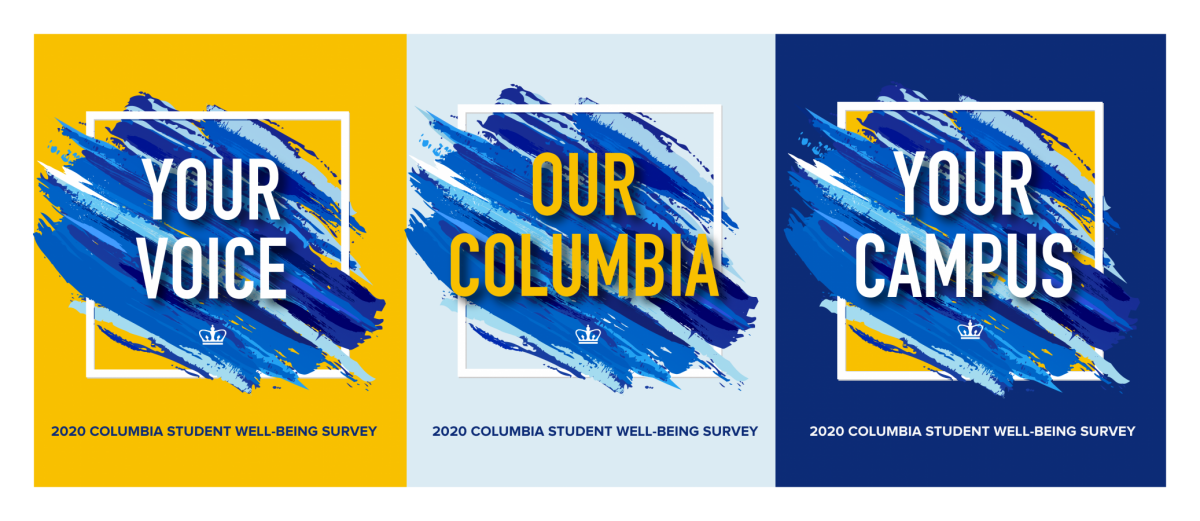Looking to complete the Columbia Lived Experiences and Needs of Students (LENS) Survey?
The Columbia Student Well-Being Survey Report is designed to share important information with all community members – including students, faculty, and staff – and to guide efforts to support and enhance the Columbia student experience.
Check here for opportunities to get involved with student events and programming this year, and stay tuned to University Life’s communications to learn about ways to get involved for the next Well-Being Survey!
Key Facts about the Columbia Student Well-Being Survey
Three Areas of Focus:
Supports Our Community By:
Key Takeaways from the 2020 Columbia Student Well-Being Survey Report
The 2020 Columbia Student Well-Being Survey took place February to mid-March 2020, with an overall participation rate of 31% (9,096). Individual school participation ranged from 26% to 52% of its students.
- A majority of survey participants feel a sense of belonging at Columbia. Students’ friendships, academic classes and projects, and interactions with faculty play a significant role in helping them feel connected and a part of the Columbia community.
- Many students are aware and make use of campus resources that support their well-being. Student survey participants identified faculty office hours to be the most used support, and rated them as having a positive impact on students’ well-being.
- While a majority of students interact with other people whose views and backgrounds are different from their own by listening or sharing their perspectives with others, some students find it more challenging to share their perspectives with others on difficult issues. This finding suggests a potential area of focus for additional support.
- Some student survey participants reported experiencing mental health and well-being challenges that include symptoms of generalized anxiety, depression, post-traumatic stress disorder, and disordered eating. While the survey closed before COVID-19 restrictions were in place, these percentages are consistent with national data over the past few years, as well as with recent studies on the impact of COVID-19.
- In spite of stressors and mental health challenges, the survey data suggest that students are generally doing well based on the flourishing scale, a validated measure of psycho-social well-being. It is worth noting, however, that survey data measured by the resilience scale, a validated measure of one’s ability to cope, suggest that many students were challenged in terms of coping in the 2019-2020 academic year. Many reported difficulties responding and adapting to or learning from and navigating through the difficult events in their lives.
- Most student survey participants have knowledge of essential information related to consent and gender-based misconduct and are aware of the campus resources available to them.
- Nearly a third of student survey participants indicated having experienced some form of gender-based misconduct prior to coming to Columbia; this is a slight increase from the 2018 Survey (approximately a quarter of survey participants shared that response in 2018).
- The majority of experiences with gender-based misconduct involved sexual harassment. There were relatively low rates of sexual assault compared to past surveys at Columbia and elsewhere.
- The percentage of student survey participants who indicated having experienced any form of gender-based misconduct at Columbia is low relative to national data and has declined from the 2018 Survey. Nonetheless, the data suggest that gender-based misconduct is still occurring and thus continues to be an area of focus, requiring ongoing attention and resources.
Interested in past data? Learn how the 2018 Survey led to enhancements to the Columbia student experience.
Read more, or download The Report on the 2018 Student Well-Being Survey.
Get Involved!
Student well-being is a collective effort, with many opportunities to get involved. Here are some ways to get started:
Students
Want to make a difference for students across the University? By becoming a Student Ambassador, you can help to promote well-being through University Life events and activities. Visit University Life for additional ways to get involved with campus activities and campus life across the University, such as:
- Join a student organization or initiative in your school
- Engage in peer education programs and well-being initiatives in your school
- Attend Wellness Days events
- Join the University Life Events Council
Also, learn more about well-being resources and mental health resources available to you on campus, in addition to other student resources.
Faculty and Staff
There are many ways to be involved:
- Visit University Life to access support resources that may be shared with students
- Learn more about resources for promoting LGBTQ+ inclusion
- Review the 2020 Survey Report with care
- Collaborate with University Life on initiatives and planning for the next survey
Please contact us at [email protected] with your ideas!
This survey has been reviewed and approved by the Columbia University Institutional Review Board. Columbia University IRB Protocol AAAS7283.

